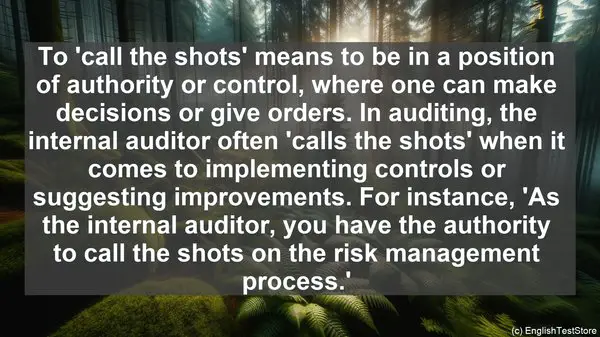Introduction to Idioms
Welcome to today’s lesson. As an internal auditor, it’s essential to have a strong command of the English language. One aspect of language learning that often poses a challenge is idioms. Idioms are phrases or expressions that have a figurative meaning, different from their literal interpretation. In this lesson, we’ll explore the top 10 idioms that are frequently used in the business and auditing context.
1. ‘In the Red’
The phrase ‘in the red’ refers to a financial situation where expenses exceed income, resulting in a loss. It’s often used to describe a company’s financial state. For example, ‘Our company has been in the red for the past quarter due to increased production costs.’
2. ‘Cook the Books’
When someone ‘cooks the books,’ it means they manipulate financial records to deceive others, usually for personal gain. This idiom is commonly associated with fraudulent accounting practices. For instance, ‘The CEO was caught cooking the books to inflate the company’s profits.’
3. ‘Dot the I’s and Cross the T’s’
This idiom emphasizes the importance of being thorough and paying attention to detail. It originates from the act of ensuring all the ‘i’s are dotted and ‘t’s are crossed in a written document. For instance, ‘Before submitting the audit report, make sure to dot the i’s and cross the t’s to avoid any errors.’
4. ‘On the Same Page’
Being ‘on the same page’ means having a shared understanding or agreement on a particular matter. In a team setting, it’s crucial for everyone to be on the same page to ensure effective collaboration. For example, ‘Let’s have a meeting to discuss the project and make sure we’re all on the same page.’
5. ‘Skeletons in the Closet’
This idiom refers to hidden or undisclosed secrets or embarrassing information about a person or organization. It’s often used when discussing the potential risks or reputational issues. For instance, ‘Before investing in a company, it’s essential to conduct due diligence and uncover any skeletons in the closet.’
6. ‘Bells and Whistles’
When something has ‘bells and whistles,’ it means it has additional features or embellishments that are not necessarily essential but add to its appeal. In the context of software or systems, it refers to extra functionalities. For example, ‘The new accounting software comes with all the bells and whistles, making it a comprehensive solution.’

7. ‘Cut Corners’
To ‘cut corners’ means to take shortcuts or do something in a hasty or incomplete manner, often to save time or money. In auditing, cutting corners can lead to errors or inaccuracies. For instance, ‘We can’t afford to cut corners during the audit process; thoroughness is crucial.’
8. ‘On the Ball’
When someone is ‘on the ball,’ it means they are alert, attentive, and quick to respond. In the auditing context, being on the ball is essential to identify and address any issues promptly. For example, ‘Our team needs to be on the ball during the inventory count to spot any discrepancies.’
9. ‘Call the Shots’
To ‘call the shots’ means to be in a position of authority or control, where one can make decisions or give orders. In auditing, the internal auditor often ‘calls the shots’ when it comes to implementing controls or suggesting improvements. For instance, ‘As the internal auditor, you have the authority to call the shots on the risk management process.’

10. ‘Think Outside the Box’
This popular idiom encourages creative and unconventional thinking. In the auditing field, thinking outside the box can lead to innovative solutions or approaches. For example, ‘When faced with a complex audit issue, it’s essential to think outside the box and consider alternative perspectives.’
Conclusion
And there you have it, the top 10 English idioms every internal auditor should know. By incorporating these idioms into your professional conversations, you’ll not only sound more fluent but also demonstrate a deeper understanding of the business world. So, go ahead, start using these idioms, and watch how they enhance your communication skills. Thank you for watching, and see you in the next lesson!
